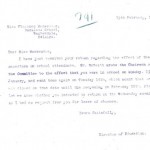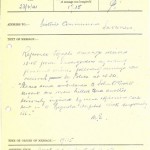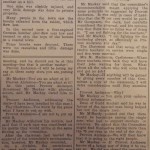On 20 February German forces under Rommel advanced as far as the British lines at El Agheila in western Libya. (The British had withdrawn many of their troops to fight in Greece and were now on the defensive there; Rommel began to build up his forces for a counter-offensive.) Meanwhile, other German troops were heading for Greece to support the struggling Italian campaign. Also this week, during 19-21 February, Swansea in south Wales suffered the “Three Nights Blitz” in which the city centre was largely destroyed and 230 people killed.
 The John O’Groat Journal reported that the recent snowstorm (“Arctic Storm in the North”) had isolated Caithness and parts of Sutherland for the second time in a fortnight. Road and rail traffic came to a standstill, and even telephones lines were down. “The greatest hardship was on the railway, the main south line being blocked for almost five days, during which about 90 people were stranded at Forsinard, a passenger train having stuck in a deep drift. A snow-plough which went out to clear the line was trapped south of Altnabreac, and engine crews and permanent-way men were marooned.”
The John O’Groat Journal reported that the recent snowstorm (“Arctic Storm in the North”) had isolated Caithness and parts of Sutherland for the second time in a fortnight. Road and rail traffic came to a standstill, and even telephones lines were down. “The greatest hardship was on the railway, the main south line being blocked for almost five days, during which about 90 people were stranded at Forsinard, a passenger train having stuck in a deep drift. A snow-plough which went out to clear the line was trapped south of Altnabreac, and engine crews and permanent-way men were marooned.”
 The Director of Education was taking a firm line over unauthorised school closures caused by the snow, writing to the teacher at Backlass School, Halkirk after a closure lasting almost a month, from 14 January to 10 February: “Please let me know whether you intended to return on the Wednesday morning, as I had no request from you for leave of absence.”
The Director of Education was taking a firm line over unauthorised school closures caused by the snow, writing to the teacher at Backlass School, Halkirk after a closure lasting almost a month, from 14 January to 10 February: “Please let me know whether you intended to return on the Wednesday morning, as I had no request from you for leave of absence.”
 The frequency with which German mines were being washed ashore along the coast of Caithness had dramatically increased at the start of 1941. Up to now, though, most had been disposed of harmlessly. Tragically, this now changed, as the Wick Control Centre recorded on 23 February: “Reference signals message received 13.15 from Invergordon regarding floating mines, [the] following message was received by Police at 13.30. “Please send ambulance to John O’Groats urgent one man killed and another seriously injured by mine explosion, case sent in to Bignold Hospital Wick dangerously ill.
The frequency with which German mines were being washed ashore along the coast of Caithness had dramatically increased at the start of 1941. Up to now, though, most had been disposed of harmlessly. Tragically, this now changed, as the Wick Control Centre recorded on 23 February: “Reference signals message received 13.15 from Invergordon regarding floating mines, [the] following message was received by Police at 13.30. “Please send ambulance to John O’Groats urgent one man killed and another seriously injured by mine explosion, case sent in to Bignold Hospital Wick dangerously ill.
Finally this week, anyone who feels that the standard of modern political debate has declined might like to read the following exchange from the meeting of Wick Burgh Council, as reported in the John O’Groat Journal:
“Mr Mackay – If Provost Anderson knows of a better way of doing it he can say so. He did not attend the committee meeting, and he should not be at this meeting – but that is another matter!
Provost Anderson – I will be losing my rag at these nasty slurs you are putting out!
Mr Mackay – You are an adept at it!
Provost Anderson – You are adept at it!
At this point Provost Anderson threatened Mr Mackay with physical action, and Mr Mackay dared him to try.”
Fortunatley reason prevailed and the matter was decided by a vote. 
